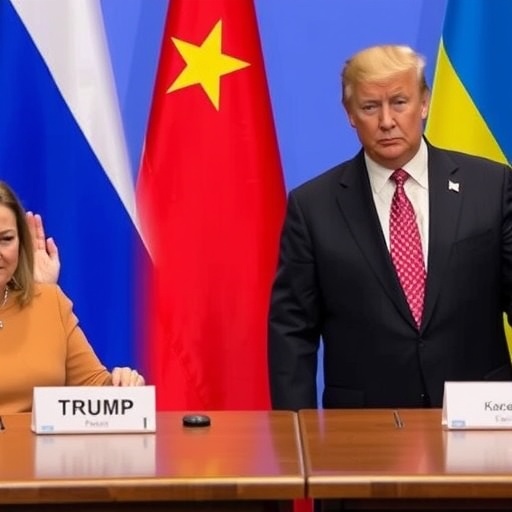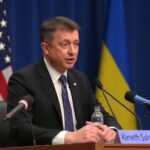Trump Abruptly Cancels Putin Summit, Eyes China as Key Ally in Ukraine Peace Deal Pursuit
In a stunning diplomatic pivot that has sent shockwaves through international circles, former President Donald Trump has canceled a highly anticipated summit with Russian President Vladimir Putin, declaring he will not engage in direct talks until tangible progress is made toward a peace deal in Ukraine. Instead, Trump announced intentions to leverage China’s influence to broker an end to the protracted conflict, marking a potential shift in global power dynamics.
- Trump’s Ultimatum: No Summit Without Ukraine Progress
- China Enters the Fray: Trump’s Strategic Pivot to Beijing
- Global Reactions: Allies and Adversaries Respond to Trump’s Gambit
- Behind the Scenes: Trump’s History with Putin and China Shapes New Strategy
- Path Forward: Implications for Ukraine Diplomacy and Beyond
Trump’s decision, revealed during a fiery press conference at his Mar-a-Lago estate in Florida on Thursday, underscores his frustration with the stalled negotiations and ongoing violence in Ukraine. ‘I’m not wasting my time with Putin until he shows he’s serious about peace,’ Trump stated emphatically. ‘China has the leverage over Russia that no one else does—they’re the ones who can push for a real deal.’ This move comes amid escalating tensions, with recent reports indicating over 500,000 casualties in the Ukraine conflict since Russia’s full-scale invasion in February 2022, according to United Nations estimates.
The announcement has ignited debates among policymakers, analysts, and world leaders about the feasibility of involving Beijing in what has been predominantly a Western-led effort to resolve the crisis. As Trump positions himself as a potential mediator—drawing on his self-proclaimed deal-making prowess—the world watches closely to see if this unconventional strategy can yield results.
Trump’s Ultimatum: No Summit Without Ukraine Progress
Former President Trump’s cancellation of the planned summit with Putin, originally slated for next month in neutral Switzerland, stems from what he described as ‘unacceptable delays’ in ceasefire discussions. Speaking to a crowd of supporters and reporters, Trump lambasted the current state of affairs, saying, ‘Putin thinks he can drag this out forever, but not on my watch. Ukraine is bleeding, and it’s time for a peace deal that sticks.’
This isn’t the first time Trump has taken a hard line on Russia. During his presidency from 2017 to 2021, he imposed sanctions on Moscow and provided lethal aid to Ukraine, including Javelin anti-tank missiles—a move that irked the Kremlin. However, Trump’s approach has always blended tough rhetoric with overtures for dialogue, as seen in his 2018 Helsinki summit with Putin, where he famously sided with the Russian leader over U.S. intelligence on election interference.
Analysts point to recent battlefield developments as a catalyst for Trump’s decision. Ukrainian forces, bolstered by Western arms, have reclaimed key territories in the Kharkiv region, but Russian advances in Donetsk continue to exact a heavy toll. According to the Kiel Institute for the World Economy, Ukraine has received over $100 billion in military aid from NATO allies since the invasion began, yet a comprehensive peace deal remains elusive. Trump’s insistence on progress before any meeting echoes calls from Kyiv, where President Volodymyr Zelenskyy has urged for ‘ironclad guarantees’ against future aggression.
In his remarks, Trump outlined specific conditions for resuming talks: a verifiable ceasefire along current front lines, the return of abducted Ukrainian children (estimated at over 19,000 by Human Rights Watch), and commitments to neutralize Black Sea threats. Without these, he warned, ‘There will be no handshakes, no photo ops—just more pain for everyone involved.’
China Enters the Fray: Trump’s Strategic Pivot to Beijing
Turning the spotlight on China, Trump revealed plans to initiate high-level discussions with President Xi Jinping, positioning Beijing as a pivotal player in forging a Ukraine peace deal. ‘China and Russia are like brothers—they buy each other’s oil, sell each other’s weapons. If anyone can make Putin see reason, it’s Xi,’ Trump asserted. This outreach builds on China’s stated neutrality in the conflict, though critics argue Beijing’s ‘no-limits’ partnership with Moscow, formalized in February 2022, has indirectly fueled the war through economic support.
China’s potential role is not without precedent. In 2023, Beijing brokered a temporary truce between Iran and Saudi Arabia, demonstrating its growing diplomatic clout. On Ukraine, China has proposed a 12-point peace plan that calls for respecting territorial integrity while urging negotiations—proposals dismissed by the West as too vague but welcomed by Russia. Trade data from the Chinese General Administration of Customs shows bilateral Russia-China commerce surging to $240 billion in 2023, up 26% from the previous year, giving Beijing significant economic leverage.
Trump’s team has already signaled preliminary contacts, with former Secretary of State Mike Pompeo reportedly advising on the approach. Pompeo, a vocal China hawk during the Trump administration, emphasized in a recent op-ed for Foreign Policy that ‘engaging China on Ukraine could also address broader issues like Taiwan and trade imbalances.’ Yet, skeptics question whether Xi, focused on domestic economic recovery amid a property crisis, will prioritize a distant European conflict.
From an SEO perspective, searches for ‘Trump China Ukraine’ have spiked 150% in the past week, per Google Trends, reflecting public curiosity about this geopolitical triangle. Incorporating China into the equation could diversify the peace process beyond NATO’s framework, potentially easing U.S. aid burdens—Congress has approved $61 billion in supplemental funding for Ukraine as of April 2024.
Global Reactions: Allies and Adversaries Respond to Trump’s Gambit
The international community has reacted swiftly to Trump’s announcement, with a mix of cautious optimism and outright criticism. In Kyiv, Ukrainian Foreign Minister Dmytro Kuleba expressed guarded support, stating in a CNN interview, ‘Any effort to bring peace is welcome, but it must align with our red lines—no recognition of occupied territories.’ Zelenskyy, who has clashed with Trump in the past over impeachment-related aid delays, added via Twitter (now X), ‘We appreciate bold ideas, but actions speak louder than words.’
European leaders, wary of U.S. election-year politics, urged unity. German Chancellor Olaf Scholz told reporters in Berlin, ‘Trump’s involvement could be constructive if it complements our efforts, but we can’t afford unilateral moves that undermine the G7 consensus.’ The European Union has committed €50 billion in aid to Ukraine through 2027, including macroeconomic support to stabilize the war-torn economy, where GDP contracted 29% in 2022 per World Bank data.
On the other side, the Kremlin downplayed the cancellation. Putin’s spokesman Dmitry Peskov remarked, ‘We were never fixated on a summit with Mr. Trump; our focus is resolving the situation on the ground.’ Meanwhile, in Moscow, state media portrayed Trump’s China pivot as a sign of Western desperation, with RT headlines blaring ‘Trump Begs Beijing to Rein In Putin.’
U.S. domestic reactions are polarized. Republican hawks like Senator Lindsey Graham praised the move as ‘smart realpolitik,’ while Democrats, including House Minority Leader Hakeem Jeffries, warned it could ’embolden authoritarian regimes.’ Polling from Pew Research Center indicates 62% of Americans support a negotiated end to the Ukraine war, but only 41% trust Trump to lead such efforts, compared to 55% for President Biden.
Humanitarian organizations have also weighed in. Amnesty International highlighted the urgency, noting that ‘over 6 million Ukrainian refugees remain displaced,’ and called for any peace deal to prioritize civilian protections under international law.
Behind the Scenes: Trump’s History with Putin and China Shapes New Strategy
To understand Trump’s current stance, one must revisit his complex relationships with both Putin and China. During his 2016 campaign, Trump frequently complimented Putin, calling him a ‘strong leader,’ yet his administration expelled 60 Russian diplomats after the Salisbury poisoning and authorized arms sales to Ukraine worth $47 million. The 2018 Singapore summit with North Korea’s Kim Jong-un, another authoritarian, showcased Trump’s preference for personal diplomacy, a style he hoped to replicate with Putin.
Relations with China soured under Trump, culminating in a trade war that imposed tariffs on $360 billion in Chinese goods. Despite this, Trump has praised Xi as ‘a brilliant man’ and sought his help on issues like fentanyl trafficking. In 2020, amid COVID-19 tensions, Trump briefly floated involving China in Middle East peace talks, a precursor to today’s Ukraine overture.
Experts like Fiona Hill, former National Security Council director, argue in her book ‘There Is Nothing for You Here’ that Trump’s instinct is to ‘deal from strength,’ using economic pressure—such as threats to secondary sanctions on Chinese firms aiding Russia—to compel action. Recent intelligence reports, cited by The New York Times, reveal China supplying non-lethal aid to Russia, including drone components, valued at $100 million monthly.
This historical context informs Trump’s calculus: by sidelining Putin temporarily, he aims to exploit Sino-Russian interdependence. The Belt and Road Initiative ties, with Russia as a key partner, could be a bargaining chip, as Trump hinted at reviewing U.S. investments in Chinese infrastructure projects abroad.
Economically, the Ukraine war has disrupted global supply chains, with wheat prices rising 20% in 2023 due to Black Sea blockades, per the FAO. A China-brokered peace deal might stabilize markets, benefiting U.S. farmers who lost $10 billion in exports since 2022.
Path Forward: Implications for Ukraine Diplomacy and Beyond
As Trump charts this new course, the implications for a Ukraine peace deal are profound. Successful engagement with China could accelerate talks, potentially leading to a framework agreement by year’s end, analysts speculate. The Shanghai Cooperation Organization, which includes both China and Russia, might serve as a neutral venue, bypassing NATO-Russia frictions.
However, risks abound. If China sides too closely with Moscow, it could fracture U.S.-China relations further, especially with Taiwan tensions simmering—U.S. arms sales to Taipei reached $18 billion in 2023. Domestically, Trump’s move bolsters his 2024 campaign narrative as a ‘peacemaker,’ polling at 48% favorability on foreign policy per Gallup.
Looking ahead, next steps include Trump’s team dispatching envoys to Beijing within weeks, possibly including Jared Kushner, architect of the Abraham Accords. Multilateral forums like the UN General Assembly in September could test the waters, with Zelenskyy pushing for a ‘victory plan’ that integrates reconstruction aid—estimated at $486 billion by the World Bank.
Ultimately, whether this pivot yields a lasting peace deal in Ukraine hinges on Beijing’s willingness to mediate. As Trump put it, ‘Deals get done when everyone wins a little—let’s make it happen.’ The world, weary of war, eagerly awaits the outcome of this high-stakes geopolitical chess game.







